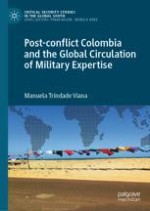2022 | OriginalPaper | Chapter
2. The Problem as a Condition for Success: The Construction of Colombia as a “Problematic Country”
Author : Manuela Trindade Viana
Published in: Post-conflict Colombia and the Global Circulation of Military Expertise
Publisher: Springer International Publishing
Activate our intelligent search to find suitable subject content or patents.
Select sections of text to find matching patents with Artificial Intelligence. powered by
Select sections of text to find additional relevant content using AI-assisted search. powered by
